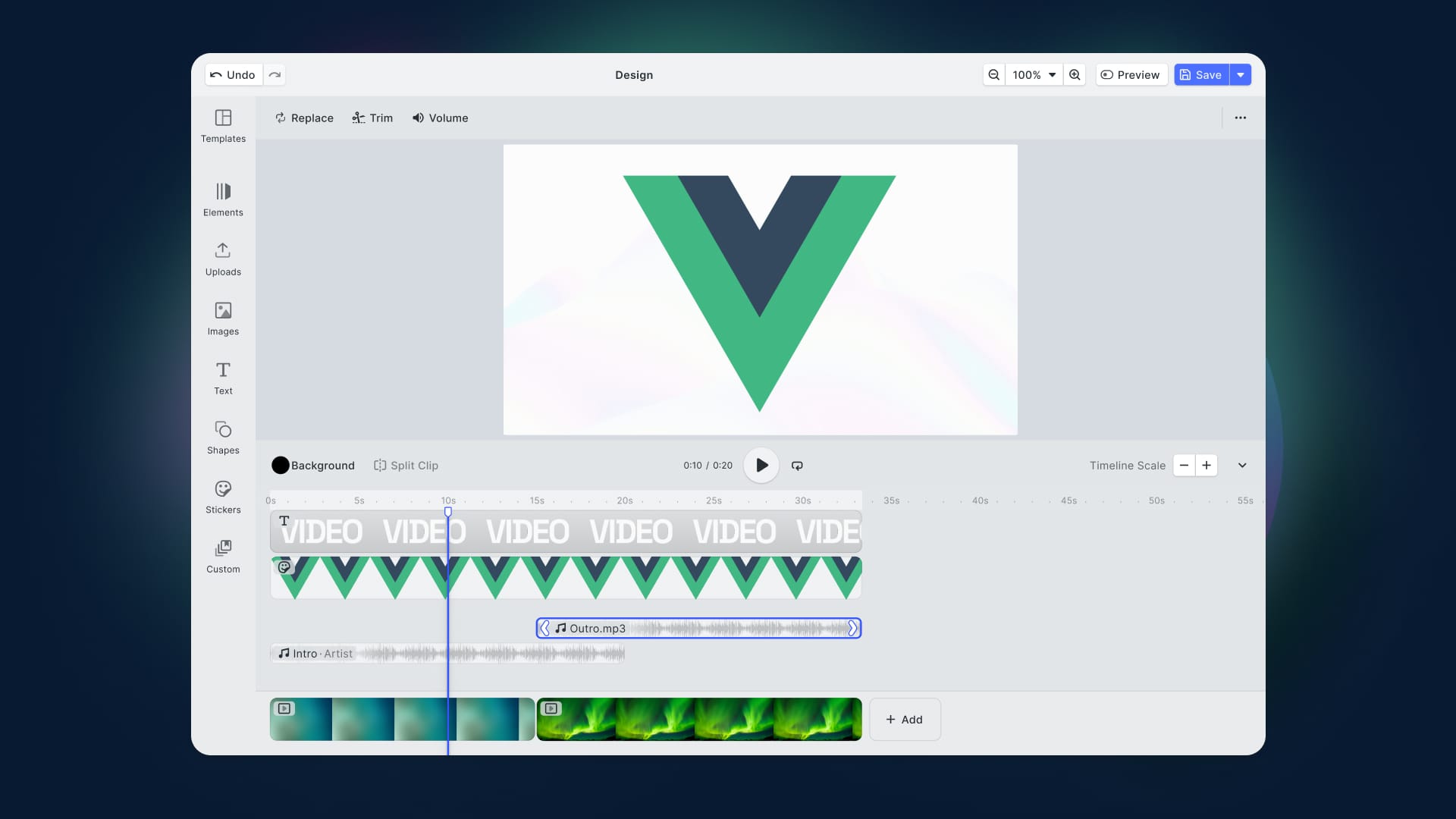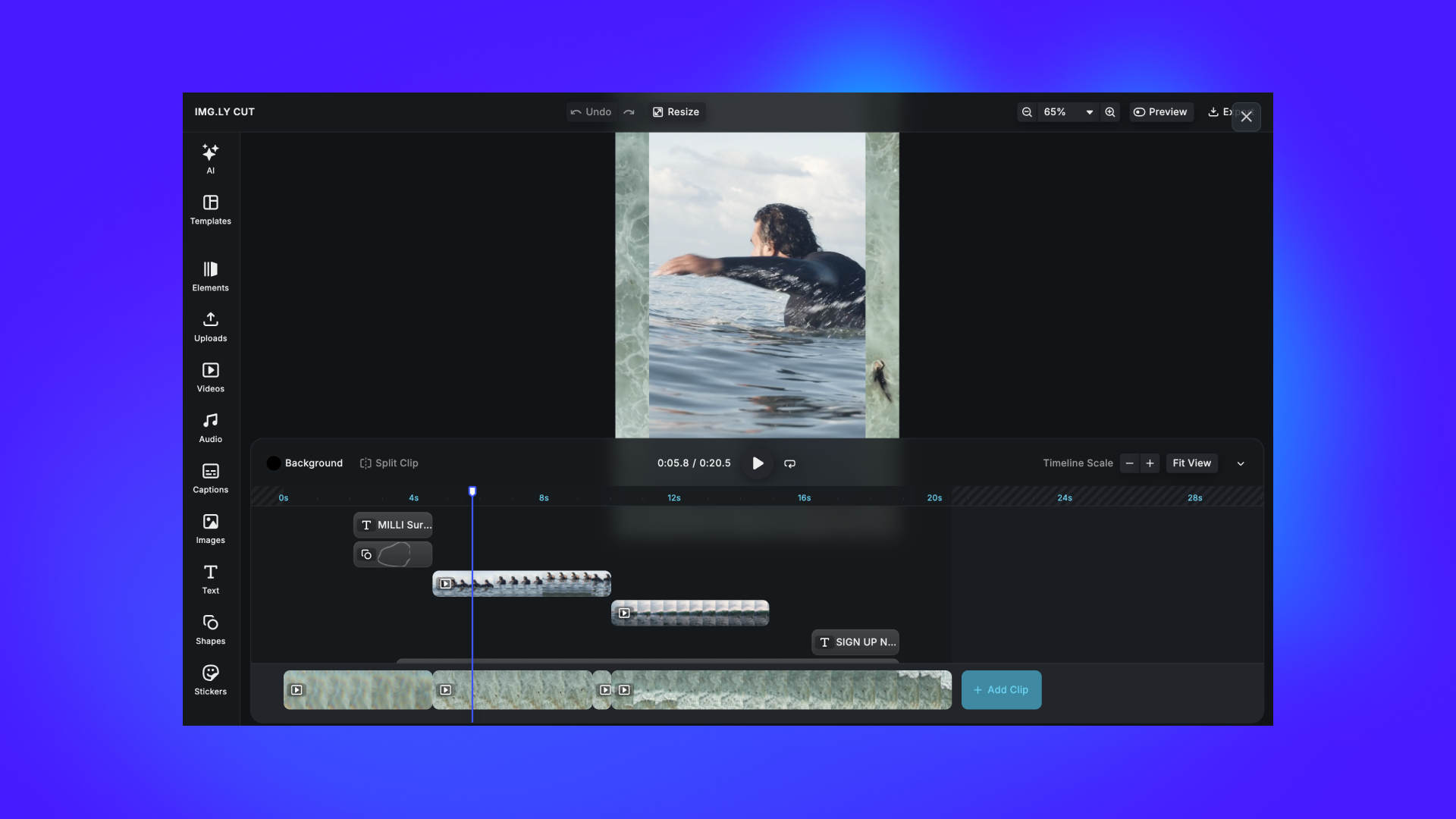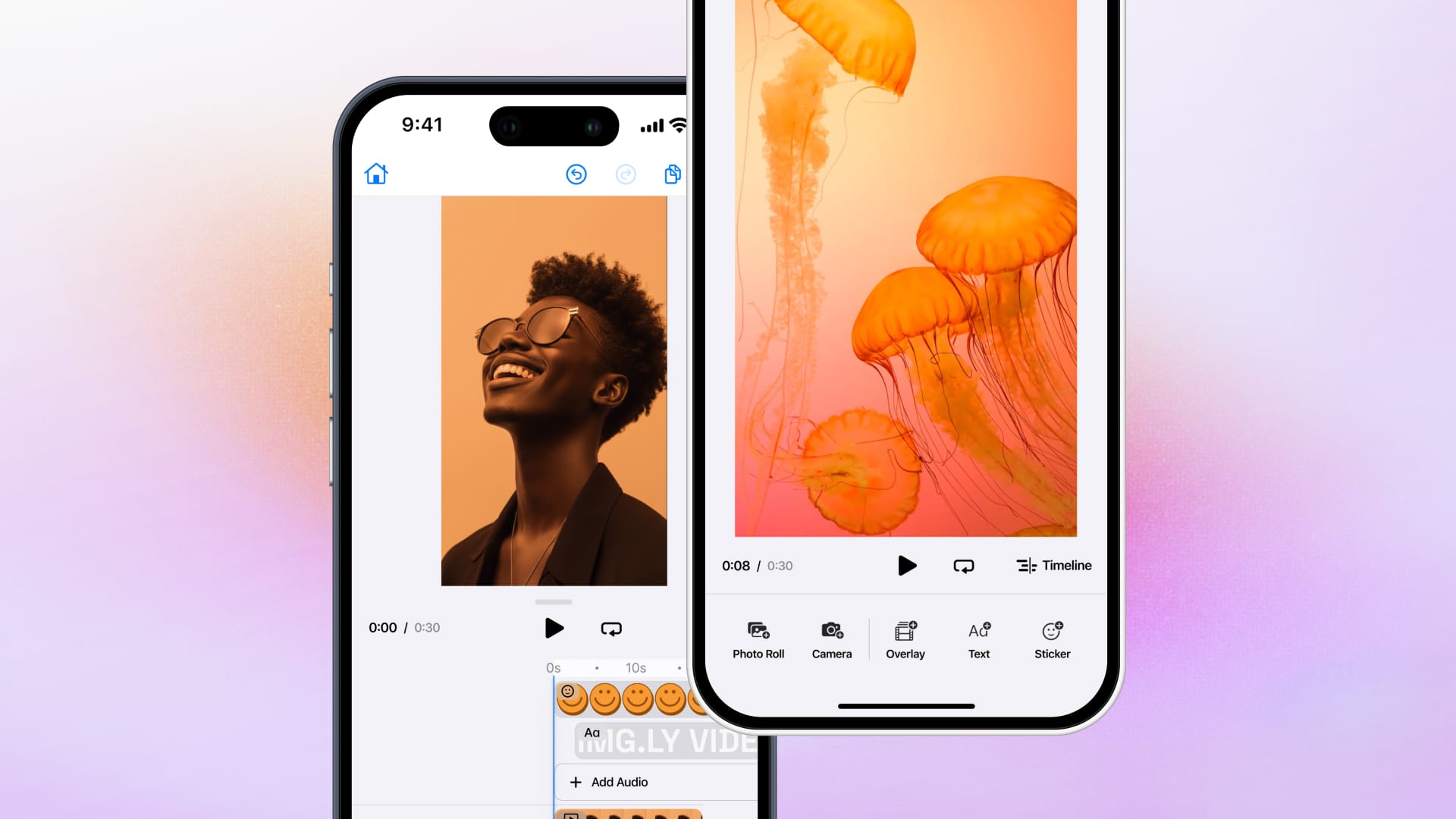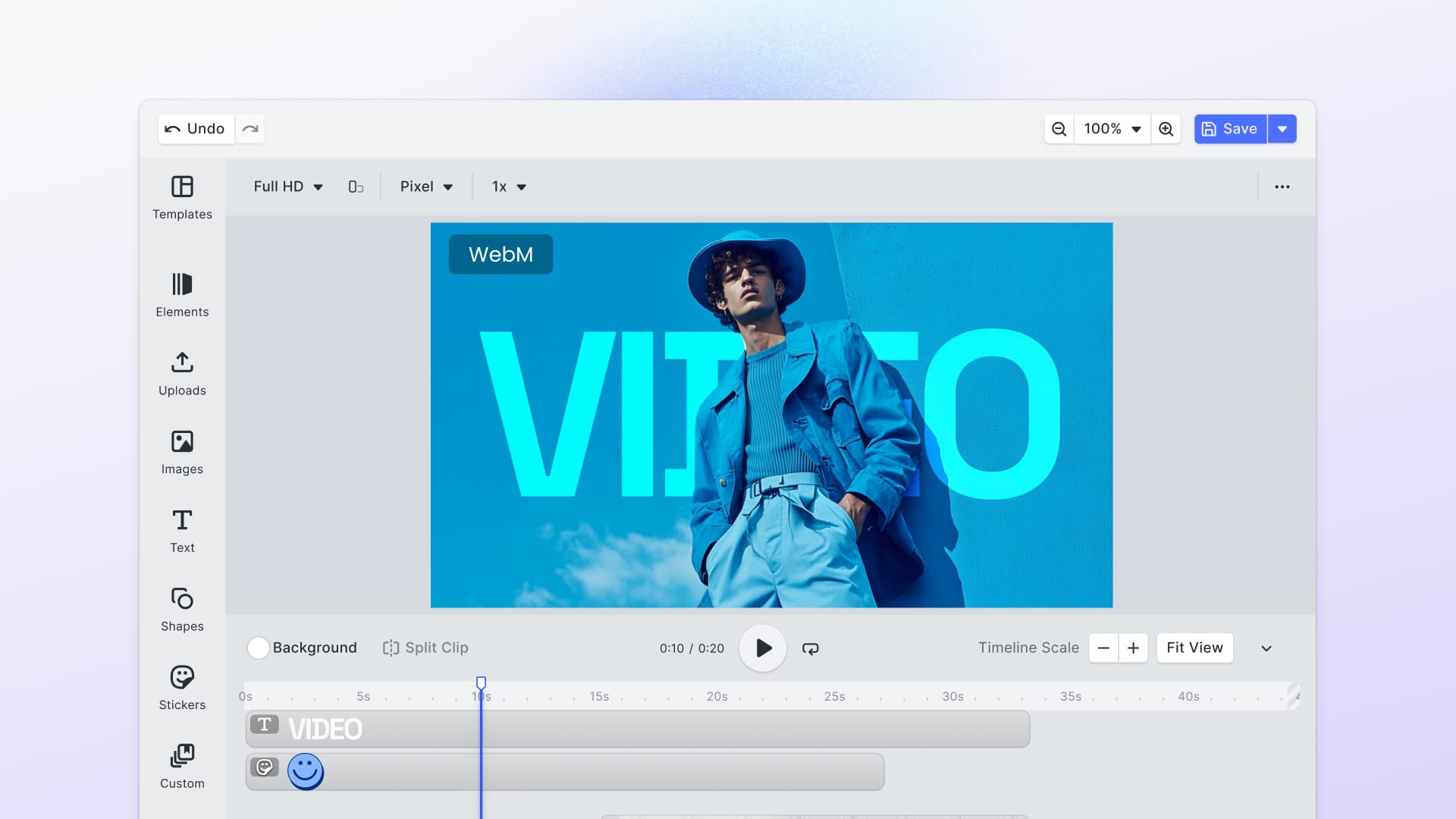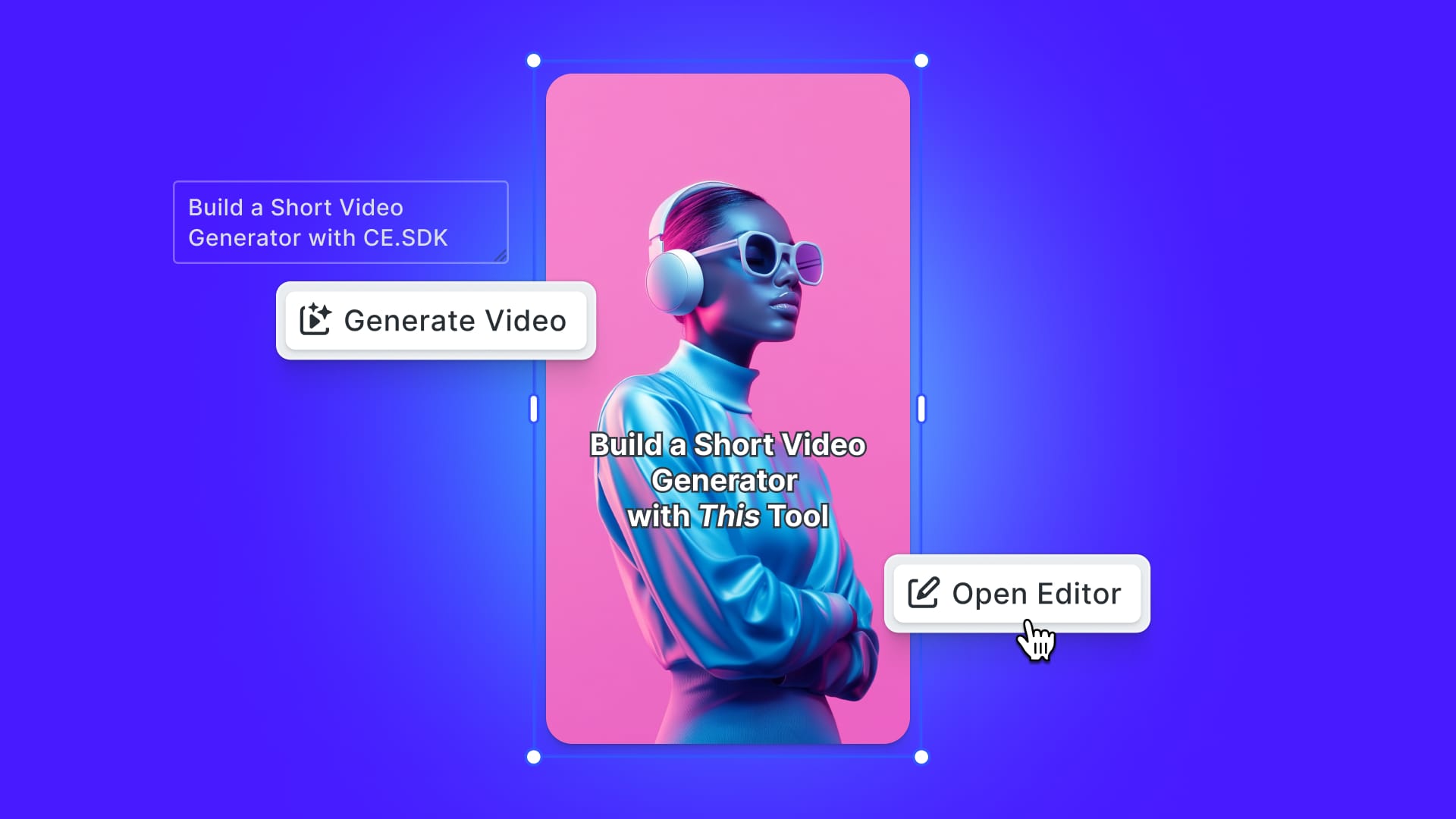Discover how to integrate IMG.LY's video editor into your Vue.js application and unlock its full potential.
Platforms like Instagram, YouTube, and TikTok have revolutionized how we engage with content, setting new standards for consuming video media. With the growing popularity of short-form videos, this trend shows no signs of slowing down.
Users now not only love to watch videos but also expect intuitive video creation and editing features from modern web applications. Here is why adding a video editor to your Vue.js web application can significantly boost user engagement and satisfaction.
In this guide, you will discover how to integrate a video editor into a Vue.js project using CreativeEditor SDK (also referred to as CE.SDK). We will also discuss when this functionality is most beneficial and how to customize the editor for your specific needs.
For a quick setup, take a look at the GitHub Vue.js video editor integration repository to kick off your project.
Let's dive in!
Why You Should Add a Video Editor to Your Vue.js App?
The digital landscape is constantly evolving, but one truth has remained steady: video content continues to dominate.
Statistics about videos are clear. According to Datareportal, over one-third of all Instagram reels are videos. Similarly, YouTube Shorts garners over 70 billion daily views, and TikTok boasts more than 1.5 billion monthly active users worldwide.
The reasons behind these staggering numbers are two:
- Videos are incredibly engaging for audiences.
- Social media platforms have made it remarkably easy to create professional-looking content.
Users now expect to be able to add filters, overlays, audio, music, and text with just a few clicks. As a result, not only do we anticipate video editing features in web applications, but we also demand that these features be simple to use.
By integrating an intuitive video editor, your Vue.js web app can capitalize on that trend. The goal is to provide a feature that billions of users are already familiar with—and likely expect from your application.
The payoff? Lowering the barriers to user-generated content, increasing engagement, and driving product distribution!
How to Integrate a Video Editor in Vue.js
In this section, you will learn how to set up a Vue.js video editor using CreativeEditor SDK.
Requirements
Before starting, ensure you have the latest LTS version of Node.js installed on your machine. Otherwise, download and install it from the official Node.js website.
If you do not already have a Vue.js project, create a new Vite-based Vue project by running the following command:
npm create vue@latestThis will install and run create-vue, the official Vue project scaffolding tool. During the process, you will be prompted to select optional features like TypeScript and testing support. Below is an example of how you can respond to the prompts:
√ Project name: ... my-vue-video-editor-app
√ Add TypeScript? ... No / Yes
√ Add JSX Support? ... No / Yes
√ Add Vue Router for Single Page Application development? ... No / Yes
√ Add Pinia for state management? ... No / Yes
√ Add Vitest for Unit Testing? ... No / Yes
√ Add an End-to-End Testing Solution? » No
√ Add ESLint for code quality? » Yes
√ Add Prettier for code formatting? ... No / YesIf you are unsure about an option, simply select "No" by pressing Enter.
After the project is set up, navigate to the project folder and install CreativeEditor SDK via @cesdk/cesdk-js package with this command:
npm install @cesdk/cesdk-jsYour package.json file will now include the SDK as a dependency:
"dependencies": {
"@cesdk/cesdk-js": "^1.41.1",
"vue": "^3.5.13",
"vue-router": "^4.4.5"
}Finally, open your project in a JavaScript IDE, and you are ready to start coding!
Create the Video Editor Component
In the src/components folder, create a new file named VideoEditor.vue. This file will serve as your Vue.js single-file component for the CE.SDK-based video editor.
In the <script> section, import the CreativeEditorSDK module from @cesdk/cesdk-js like this:
import CreativeEditorSDK from '@cesdk/cesdk-js';Next, create your video editor component using the following lines of code:
<!-- src/components/VideoEditor.vue -->
<template>
<div id="cesdk_container" style="height: 100vh; width: 100vw"></div>
</template>
<script>
import CreativeEditorSDK from '@cesdk/cesdk-js'
export default {
props: { config: Object },
_cesdk: null,
mounted: function mounted() {
CreativeEditorSDK.create('#cesdk_container', this.config).then(async (instance) => {
this._cesdk = instance
// customize the editor behavior...
})
},
methods: {},
watch: {},
beforeUnmount: function beforeDestroy() {
// clean up the CE.SDK instance
if (this._cesdk) {
this._cesdk.dispose()
this._cesdk = null
}
},
}
</script>The component defined above embeds the CreativeEditorSDK JavaScript element into an HTML <div> container.
Use the Component
You can now import the VideoEditor component in the <script> section as follows:
import VideoEditor from './components/VideoEditor.vue';Then, include it in the <template> section as shown in this snippet:
<VideoEditor
:config="{
license: '<YOUR_LICENSE>',
userId: '<YOUR_USER_ID>',
}"
/>Replace <YOUR_LICENSE> with the license key provided by CreativeEditor SDK and <YOUR_USER_ID> with your user ID to optionally track monthly active users (MAUs) across different devices.
This setup will launch the video editor with a video preset, enabling users to trim, cut, apply filters, add text overlays, include music, and perform other enhancements to their videos.
Use Cases for the Vue.js Video Editor
Now that you have seen how to build a Vue.js video editor component with a basic CreativeEditor SDK setup, it is time to explore some practical use cases and scenarios.
Automated Marketing
CreativeEditor SDK equips marketers with powerful tools to produce branded videos for multiple campaigns at scale. Key features for this task include:
- API Integration: Integrate the SDK's API to automate the creation of videos, reducing manual effort and supporting large-scale video production. This opens the door to automated workflows for marketing campaigns, ad creation, and A/B testing.
- Pre-Designed, Editable Templates: Define placeholders, lock or unlock specific design elements, and guide what other users can edit and how. Thanks to this template-based process, it is possible to produce professional assets by leveraging editable video templates.
- Template Import from Photoshop: Configure the SDK to bulk import .PSD files from Adobe Photoshop, converting them into the CE.SDK scene archive format for streamlined design integration and editing.
- Manage Branded Assets: Build custom content libraries to manage brand assets, including logos, vector graphics, stock photos, and templates.
These capabilities make CE.SDK a reliable technology for scalable, efficient, and brand-consistent video marketing automation.
Informative Videos for E-Learning
CreativeEditor SDK gives educators, teachers, and coaches the tools they need to create impactful and information-rich videos. The entire content creation and editing process requires no advanced technical skills. In detail, users can record, edit, and organize videos across desktop, mobile, or tablet devices.
Beyond simplifying video production, the SDK is based on reusable templates, so that instructors can quickly adapt materials for various topics while maintaining consistency. Additionally, interactivity plugins—featuring quizzes, polls, and other learner-focused elements—enhances engagement, making lessons more dynamic and personalized.
Unique Videos for Lead Outreach
Cold emails often feel dull and impersonal, frequently ending up in the spam or trash folder. In contrast, personalized video messages are revolutionizing lead outreach.
CreativeEditor SDK empowers sales, marketing, and business development teams to deliver engaging videos that outshine standard email pitches, offering features such as:
- Customized Video Messages for Leads: Craft personalized videos for specific clients or prospects, adding a genuine human touch to your messages. Thanks to configurable text variables, you can customize video content at scale to leave a lasting impression compared to traditional cold emails.
- Seamless Integration for Scalable Outreach: Produce professional and customized video messages at scale, making it easy for sales teams to personalize outreach without sacrificing efficiency.
- Translation Capabilities for Global Reach: Leverage the SDK’s built-in translation and internationalization features to communicate with audiences worldwide. Adapt your messages to the local customs to convey a truly personalized experience. Test this feature in our translation demo.
Take your lead outreach to the next level with these innovative video solutions.
Social Media Video Content Generation
CE.SDK offers all the tools users need to create captivating videos. It makes it easy to produce shareable content for platforms like Instagram, TikTok, YouTube, LinkedIn, and more.
Users can take advantage of reusable templates to rapidly bring their ideas to life, without having to start from scratch. They can choose from a variety of pre-designed options, which you can explore in our video editor demo.
The support for configurable animations increase engagement and improve the visual appealing. In the SDK, users can also set the mood with music or add narration. Once complete, videos can finally be seamlessly exported in the ideal format and aspect ratio for social media platforms.
Digital Asset Management
Digital Asset Management, commonly referred to as DAM, is the process of organizing, storing, and managing digital assets—such as videos. Given the large volume of assets companies produce and the way employees and users interact with them, DAM has become a key business process for many organizations.
CreativeEditor SDK supports DAM by offering an embeddable Vue.js video editor UI component, allowing for centralized video organization, production, repurposing, and editing. This component exposes features like:
- Asset Libraries: CE.SDK can load assets from local files or even integrate third-party libraries via API. Users can search and browse local assets as well as remote images from platforms like Pexels, Unsplash, and Getty within the editor. You can explore our asset library demo.
- Permissions for Asset Control: Although the SDK does not include role-based permissions out of the box, it connects with backend technologies to manage user access and permissions.
- Extendability for Custom Permissions: Developers can extend the SDK to create custom hooks that check permissions and modify the editor’s behavior, ensuring the right users have access to and can edit assets.
These features make CreativeEditor SDK a valuable tool for businesses managing video assets while maintaining brand consistency and workflow efficiency.
Customizing your CreativeEditor SDK Instance
CreativeEditor SDK does not provide a static, pre-configured Vue.js video editor experience. Instead, it supports a large set of customization options to tailor the editor to your specific needs and brand requirements.
Key customization features include:
- Build Custom UIs: Create fully personalized user interfaces and adapt the editor to your specific use case. This includes repositioning toolbar elements, changing icons, or renaming tools to provide a unique editing experience.
- Feature Activation: Enable or disable features based on default settings, giving you control over what is available to users.
- Internationalization (i18n): Tailor the video editor to different languages and regions. CE.SDK fully supports i18n, enabling you to overwrite and extend all text strings in any language.
- Media Libraries: Define custom, sortable, resource-rich media libraries. CE.SDK supports integration with third-party libraries via API for easy access to external media assets.
- Single Page Mode: Configure the editor to display only one active page at a time for a streamlined experience.
- Theming: Adjust the editor’s theme to align with your app’s design. Choose from built-in themes, generate new ones using the theme generator, or manually create a custom theme. Test theming in our demo page.
See all of these customizations in action in our customization demo.
Conclusion
Featuring a Vue.js video editor in your web application can greatly improve the user experience, making it a valuable addition to boosting product success, user reviews, and retention. This is true whether you are building a sales tool, an e-learning platform, or a web app with social media integration.
With CreativeEditor SDK, you can integrate a fully customizable video editing experience into your Vue.js application in minutes.
By following the steps outlined in this blog post, you saw how to bring professional-level video editing features to your web users. Explore CE.SDK’s video capabilities and dive into the docs.
Stay tuned for more updates, and please reach out if you have any questions. Thank you for reading.
Over 3,000 creative professionals gain early access to our new features, demos, and updates—don't miss out, and subscribe to our newsletter.

